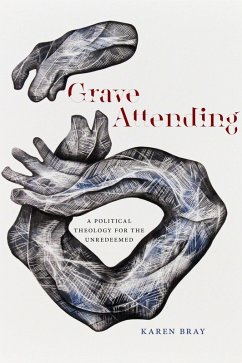A thorough critique of the redemptive narratives of neoliberalism in US politics and society. "This is a book about what it would mean to be a bit moody in the midst of being theological and political. Its framing assumption is that neoliberal economics relies on narratives in which not being in the right mood means a cursed existence." So begins Grave Attending: A Political Theology for the Unredeemed, which mounts a challenge to neoliberal narratives of redemption. Mapping the contemporary state of political theology, Karen Bray brings it to bear upon secularism, Marxist thought, affect theory, queer temporality, and other critical modes as a way to refuse separating one's personal mood from the political or philosophical. Introducing the concept of bipolar time, she offers a critique of neoliberal temporality by countering capitalist priorities of efficiency through the experiences of mania and depression. And it is here Bray makes her crucial critical turn, one that values the power of those who are unredeemed in the eyes of liberal democracy?those too slow, too mad, too depressed to be of productive worth?suggesting forms of utopia in the poetics of crip theory and ordinary habit. Through performances of what she calls grave attending?being brought down by the gravity of what is and listening to the ghosts of what might have been?Bray asks readers to choose collective care over individual overcoming. Grave Attending brings critical questions of embodiment, history, and power to the fields of political theology, radical theology, secular theology, and the continental philosophy of religion. Scholars interested in addressing the lack of intersectional engagement within these fields will find this work invaluable. As the forces of neoliberalism demand we be productive, efficient, happy, and flexible in order to be deemed worthy subjects, Grave Attending offers another model for living politically, emotionally, and theologically. Instead of submitting to such a market-driven concept of salvation, this book insists that we remain mad, moody, and unredeemed. Drawing on theories of affect, temporality, disability, queerness, work, and race, Bray persuades us that embodying more just forms of sociality comes not in spite of irredeemable moods, but through them. "In Grave Attending, Bray forges a bold, and yet surprisingly gentle, theological response to the driving economies of salvation that flow through the bloodstream of US politics and American Christianity. Immersed in multiple scholarly discourses, Bray manages to expose the significance of theology amongst these, as her theological vision insists on countering the pathologizing forces that either numb us or compel us to rise above suffering. She catches readers off-guard by crafting a lyrical work of theology that claims moods and modes of reflection that are often deemed unsuitable and unworthy. Bray's theology claims the damned and damns the redemptive." -Shelly Rambo, Boston University
Dieser Download kann aus rechtlichen Gründen nur mit Rechnungsadresse in A, B, BG, CY, CZ, D, DK, EW, E, FIN, F, GR, HR, H, IRL, I, LT, L, LR, M, NL, PL, P, R, S, SLO, SK ausgeliefert werden.


